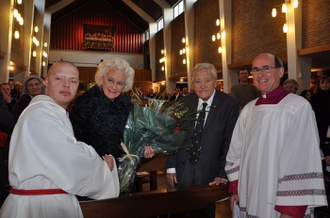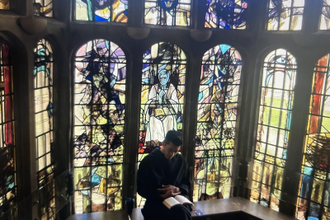Service celebrates legislation which transformed lives of millions

l-r Alex presenting flowers, Lady Morris, Lord Morris, Canon Pat Browne (pic - Archdiocese Westminster)
The first piece of legislation in the world giving rights to people with disabilities, was endorsed by the House of Commons on 5 December 1969. The 40th anniversary of the enactment of the Chronically Sick and Disabled Persons Act was marked by a special service today, at Holy Apostles Catholic Church in Pimlico, Westminster.
The Celebrant was Archbishop Vincent Nichols. Guest of honour at the service was Lord Morris of Manchester, who as Alf Morris, MP for Manchester, Wythenshawe, proposed and then had enacted the Act of Parliament which has had a major impact of the lives of millions of people with disabilities around the world.
During the service, the Rt Hon Tom Clarke CBE MP spoke about the significance of the Act. He said: "Today we gather together to express our gratitude to Alf and Irene and all who made such progress possible."
"And Alf, we will never forget what you said in that wonderful speech on the 25th Anniversary of your Act"
“Unfair discrimination leaves disabled people doubly disabled. That is morally wrong and what is morally wrong ought surely no longer to be legally permissible in Britain.”
"That remains our inspiration, our hope and our prayer."
In a reflection, Archbishop Vincent Nichols drew attention to the clear and far-sighted vision of Lord Morris of a society in which disabilities or chronic sickness would no longer exclude people from so many of its activities and advantages.
He said: "This was an immense sign of hope. Over the last forty years we have seen the achievements of this Disabilities Discrimination Act spread throughout society, with its principle aim of placing ‘needs before means’ now so widely accepted. In so many areas of society, including schools, commercial premises and churches, we have been able to witness the increasing active participation and unique contribution of people who, in the past, would not even have been present. For all of this today we thank God."
He went on to say that people who are apparently weakest are those who are often most close to God. This, he said, is often so because they live, each moment of each day, with a degree of dependence on others.
Archbishop Nichols said: "The radical truth about our nature is that we are profoundly dependent on each other, and ultimately on the God who creates us out of love and draws us, for the sake of that same love, into a fullness of life which we do not easily understand. This is the mystery which so often is nearer to the grasp of those who live with disability. This is the secret heart of what they have to teach us, an able-bodied and self-willed majority which so often pushes away our radical dependence on others as no more than a sign of weakness. Yet it is out of such weakness that true and lasting human strength is ultimately built. This is the lesson of love, so often glimpsed in our own relationships. It is the lesson of love taught in its fullness in the death of Jesus who, in accepting every weakness, gives his life that we may see, learn and be transformed."
Those attending the service included Councillor Judith Warner, Lord Mayor of Westminster, MPs, members of the House of Lords, including Baroness Masham of Ilton who made her maiden speech in the House of Lords on the Act and other civic dignatories. Music was performed by members of the St Thomas More Language College, Chelsea, the organ was played by Nicholas Lane, hymns sung by the Maria Fidelis Gospel Choir and a special dance was performed by the Larondina Dance Group from the Alessendre Special Needs Dance School.
Towards the end of the service, Lord Morris read these final words of the historic speech he made commending his Chronically Sick and Disabled Persons Bill to the House of Commons on 5 December 1969:
'Mr Speaker, if we could bequeath one precious gift to posterity, I would choose a society in which there is genuine compassion for long-term sick and disabled people; where understanding is unostentatious and sincere; where needs come before means; where if years cannot be added to their lives, at least life can be added to their years; where the mobility of disabled people is restricted only by the bounds of technical progress and discovery; where they have the fundamental right to participate in industry and society according to their ability; where socially preventable distress is unknown and where no one has cause to be ill at ease because of her or his disability.
To read the full addresses by Archbishop Nichols and Rt Hon Tom Clarke CBE MP
see: www.indcatholicnews.com/news.php?viewStory=17207
and www.indcatholicnews.com/news.php?viewStory=17206
Source: Archbishops' House/ICN















